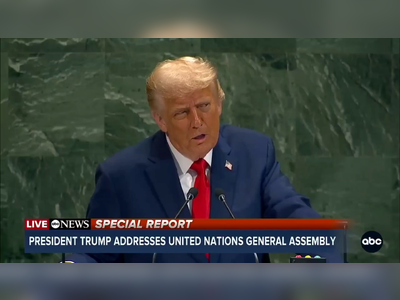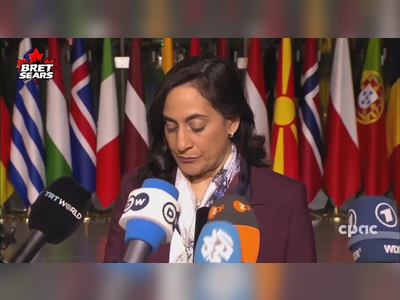Ibex 35 Suffers Significant Losses Amid Global Market Turmoil
The Spanish stock index sees a sharp decline following the announcement of tariffs by former President Donald Trump.
The Ibex 35 index, which tracks the 35 largest listed companies in Spain, experienced a tumultuous trading session marked by a significant downward trend.
This decline, referred to as 'Manic Monday' by market observers, followed the recent announcement of tariffs by former President Donald Trump, which has sent shockwaves through global financial markets.
On April 2, 2025, following Trump's tariff proclamation, the Ibex 35 recorded its second-largest decline among major indices, trailing only behind Milan's FTSE MIB, which dropped by 5.18%.
In total, over three days of trading characterized by turmoil, the Ibex 35 has seen a value depreciation of approximately 12%, equating to a loss of market capitalization of €88.618 billion, according to data from Spanish stock market authorities.
This staggering amount reflects a significant economic impact, as it represents around 5.56% of Spain's total Gross Domestic Product (GDP), which was reported at €1.593 trillion for the year 2024. Furthermore, the losses in the stock market have surpassed the €69.528 billion that Spain requested from the European Recovery and Resilience Mechanism in 2022 as non-repayable transfers, according to official government figures.
The sectors most adversely affected include banking and consumer products, amid forecasts from economists predicting that Trump's trade policies could precipitate an economic recession.
Leading banks such as Banco Sabadell, Unicaja, and CaixaBank have experienced substantial declines, with losses of 10.96%, 10.56%, and 10.20% respectively, in the past week alone.
The financial sector, represented by six major firms, suffered a total loss exceeding €22 billion in just one day of trading.
Consumer goods companies with strong exposure to the U.S. market, such as Puig and Inditex, also faced significant setbacks.
Puig's shares fell by 4.48% over the week, while Inditex saw a decline of 2.12%.
Affected by the market panic, the tourism sector, represented by companies like IAG, reported losses of 5.76% and 4.65% on subsequent trading days.
In stark contrast, the telecommunications and energy sectors, which briefly showed resilience, were not immune to the broader market declines.
Notable companies such as Cellnex, Solaria, and Iberdrola also succumbed to losses, contributing to a substantial retreat in the stock market.
The trading session on April 5 saw all companies listed on the Ibex 35 end in negative territory, with significant disruptions to trading operations experienced in the early moments of the day.
Notably, Cellnex led the losses with a decrease of 7.47%, followed closely by Acciona, which reported a 7.14% drop, resulting in a loss of roughly €446 million.
Indra also saw a decline of 7.02%, equating to an approximate loss of €329 million.
Furthermore, oil company Repsol was impacted by fluctuations in oil prices, experiencing a decline of 6.86% and a market capitalization loss of around €1.098 billion.
These shifts signify broader economic implications as the European market grapples with the fallout from international trade tensions.
This decline, referred to as 'Manic Monday' by market observers, followed the recent announcement of tariffs by former President Donald Trump, which has sent shockwaves through global financial markets.
On April 2, 2025, following Trump's tariff proclamation, the Ibex 35 recorded its second-largest decline among major indices, trailing only behind Milan's FTSE MIB, which dropped by 5.18%.
In total, over three days of trading characterized by turmoil, the Ibex 35 has seen a value depreciation of approximately 12%, equating to a loss of market capitalization of €88.618 billion, according to data from Spanish stock market authorities.
This staggering amount reflects a significant economic impact, as it represents around 5.56% of Spain's total Gross Domestic Product (GDP), which was reported at €1.593 trillion for the year 2024. Furthermore, the losses in the stock market have surpassed the €69.528 billion that Spain requested from the European Recovery and Resilience Mechanism in 2022 as non-repayable transfers, according to official government figures.
The sectors most adversely affected include banking and consumer products, amid forecasts from economists predicting that Trump's trade policies could precipitate an economic recession.
Leading banks such as Banco Sabadell, Unicaja, and CaixaBank have experienced substantial declines, with losses of 10.96%, 10.56%, and 10.20% respectively, in the past week alone.
The financial sector, represented by six major firms, suffered a total loss exceeding €22 billion in just one day of trading.
Consumer goods companies with strong exposure to the U.S. market, such as Puig and Inditex, also faced significant setbacks.
Puig's shares fell by 4.48% over the week, while Inditex saw a decline of 2.12%.
Affected by the market panic, the tourism sector, represented by companies like IAG, reported losses of 5.76% and 4.65% on subsequent trading days.
In stark contrast, the telecommunications and energy sectors, which briefly showed resilience, were not immune to the broader market declines.
Notable companies such as Cellnex, Solaria, and Iberdrola also succumbed to losses, contributing to a substantial retreat in the stock market.
The trading session on April 5 saw all companies listed on the Ibex 35 end in negative territory, with significant disruptions to trading operations experienced in the early moments of the day.
Notably, Cellnex led the losses with a decrease of 7.47%, followed closely by Acciona, which reported a 7.14% drop, resulting in a loss of roughly €446 million.
Indra also saw a decline of 7.02%, equating to an approximate loss of €329 million.
Furthermore, oil company Repsol was impacted by fluctuations in oil prices, experiencing a decline of 6.86% and a market capitalization loss of around €1.098 billion.
These shifts signify broader economic implications as the European market grapples with the fallout from international trade tensions.
Translation:
Translated by AI
AI Disclaimer: An advanced artificial intelligence (AI) system generated the content of this page on its own. This innovative technology conducts extensive research from a variety of reliable sources, performs rigorous fact-checking and verification, cleans up and balances biased or manipulated content, and presents a minimal factual summary that is just enough yet essential for you to function as an informed and educated citizen. Please keep in mind, however, that this system is an evolving technology, and as a result, the article may contain accidental inaccuracies or errors. We urge you to help us improve our site by reporting any inaccuracies you find using the "Contact Us" link at the bottom of this page. Your helpful feedback helps us improve our system and deliver more precise content. When you find an article of interest here, please look for the full and extensive coverage of this topic in traditional news sources, as they are written by professional journalists that we try to support, not replace. We appreciate your understanding and assistance.









